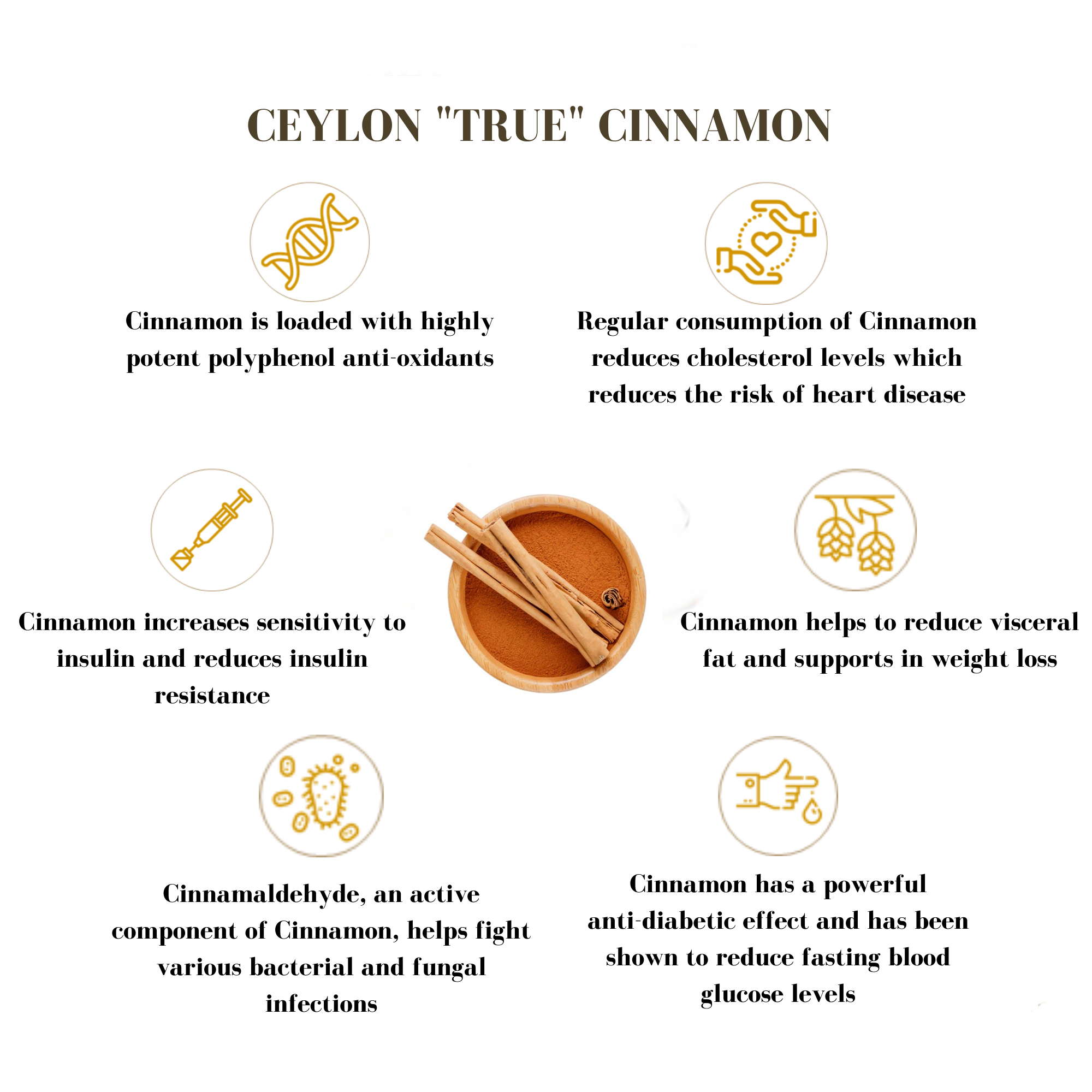Ceylon Cinnamon
Health Benefits

Ceylon Cinnamon
Health Benefits
We source from over 10 countries around the globe and acquiring spices from each corner of the world is important to us. It brings people together where no other way can. Additionally, we distribute 13 million lbs. of spices per year
- Banwelgodalla, Aluthwala, Galle (80332), Sri Lanka
- info@samadiexport.com
- samadiexport9@gmail.com
- +94 762677051

Health Vs Ceylon Cinnamon
One of the most important active ingredients in cinnamon is cinnamaldehyde. It’s used in flavorings and fragrances. It may be responsible for some of cinnamon’s possible health benefits. Some research shows cinnamon may be good for people with diabetes. A review of 18 studies suggests that cinnamon might lower blood sugar. But it didn’t affect hemoglobin A1C, which is an indicator of blood sugar levels over a long period. It may also lower cholesterol in people with diabetes. Many of the studies don’t indicate what type of cinnamon was used or have other problems that make their findings uncertain. One review suggests that cinnamon might help with obesity and weight loss. It’s sometimes used for irritable bowel syndrome or other stomach or intestinal problems. But it isn’t clear that it works.
How Ceylon Cinnamon Effect to Human Body
Cinnamon is thought to have many medicinal and soothing properties, and is used frequently in Chinese herbal medicine. The distinctive smell and flavour of cinnamon comes from the essential oils contained in the bark, called cinnamaldehyde. Cinnamaldehyde displays anti-viral, anti-bacterial and anti-fungal properties. Cinnamon also contains large amounts of polyphenol antioxidants. Antioxidants can help protect the body from disease and are found in fruits, vegetables, herbs and spices. The antioxidants in cinnamon have been found to have anti-inflammatory effects.

Cinnamon for Brain Health
That’s because cinnamon was long believed to have healthful and medicinal properties that made it extremely valuable. Cinnamon is excellent for brain health and some rigorous studies have found a variety of neurological benefits that cinnamon offers
Cinnamon may delay or reverse cognitive impairment. A study in rats found that cinnamon improved cognition and reduced oxidation in the brain.


Cinnamon for Anti Clotting
Blood thinners, often called anti-coagulants, decrease the blood’s ability to clot. Clots can obstruct blood vessels, leading to heart attack and stroke. Typically, physicians prescribe blood thinners to those who have atrial fibrillation, congestive heart failure and phlebitis. Sometimes it’s prescribed for those who are obese, according to the Texas Heart Institute.


Cinnamon for Arthrities Relief
Blood thinners, often called anti-coagulants, decrease the blood’s ability to clot. Clots can obstruct blood vessels, leading to heart attack and stroke. Typically, physicians prescribe blood thinners to those who have atrial fibrillation, congestive heart failure and phlebitis. Sometimes it’s prescribed for those who are obese, according to the Texas Heart Institute.

Cinnamon for Digestive Aid
Most therapeutic uses of Chinese cinnamon bark are rooted in its historical use as a traditional medicine and on laboratory and animal studies. Test-tube or animal research does not guarantee safety or effectiveness in humans, but German health authorities (Commission E) do approve of cinnamon bark for mild gastrointestinal spasms, stimulating appetite and relieving indigestion.

Cinnamon for Lower Cholesterol
There’s little evidence that cinnamon can lower your cholesterol, so cinnamon isn’t recommended to treat high cholesterol. Although some cholesterol-lowering effects have been seen in animal studies, there’s little evidence that this applies to humans. Most of the trials have shown no effect on blood cholesterol. Much more study is needed.
However, cinnamon can be a healthy way to add flavor to foods, especially in place of adding sugar or salt.

Cinnamon for Anti-Bacterial
Plants have historically been used in traditional medicine as sources of natural antimicrobial substances for the treatment of infectious disease. Therefore, much attention has been paid to medicinal plants as a source of alternative antimicrobial strategies. Moreover, due to the growing demand for preservative-free cosmetics, herbal extracts with antimicrobial activity have recently been used in the cosmetic industry to reduce the risk of allergies connected to the presence of methylparabens. Some species belonging to the genus Cinnamomum, commonly used as spices, contain many antibacterial compounds.

Cinnamon for Blood Sugar Regulation
Cinnamon is an aromatic spice derived from the bark of several species of Cinnamomum trees.While you may associate cinnamon with rolls or breakfast cereals, it has actually been used for thousands of years in traditional medicine and food preservation. To obtain cinnamon, the inner bark of Cinnamomum trees must be removed. The bark then undergoes a drying process that causes it to curl up and yield cinnamon sticks, or quills, which can be further processed into powdered cinnamon.

Cinnamon for Lower Blood Pressure
High blood pressure is one of the most common diseases in India. Also known as hypertension, high blood pressure can make a person prone to risks of heart disease and stroke. Eating healthy and exercising regularly is considered to be the best ways for keeping your blood pressure under control. Intake of salt, sodium and processed foods must be controlled for maintaining normal levels of blood pressure. Also, it has now been found that eating cinnamon may help in dealing with hypertension.
More Benefits of Cinnamon

